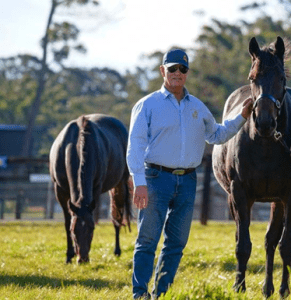05 Sep “With dyslexia you have an advantage- you’re looking for innovative solutions to get round a problem”

Steve Grant has had a diverse and successful career including property development, construction and then macadamia nut farming. With his wife Eliza, Steve is now involved in the thoroughbred industry on Silverdale Farm where he also has an Academy helping young people access work in the thoroughbred breeding and racing industry. The Hotline caught up with Steve recently to talk about how the strategies he developed with his dyslexia have contributed to his successful career.
It wasn’t until ten years ago that Steve was actually diagnosed as having dyslexia. Though he found school difficult, there was no special assistance for his literacy difficulties. He was good at maths but found English hard. “I can remember the Year 3 Spelling Bees where the teacher would go around the room testing everyone. I would have to get out of that room before it got to me. I would think of lots of ways I could get out of class before my turn.”
Much of his school experience involved developing work arounds to compensate for his reading and writing difficulties. Steve wanted to leave high school, and his parents agreed only if he could get work. After many applications an employer offered him a job on the basis that he enrol in the Building Certificate course at TAFE. “When I went to enrol, the teachers said I had to do two make up courses English and Science before I started the course. However, I needed to be enrolled concurrently as I had to be doing the Building Certificate course to get the job. I stayed in the TAFE office for over 4 hours trying to negotiate for a concurrent enrolment. Eventually they agreed and I began studying for 4-5 nights.”
“When I became the Chairman of the TAFE Advisory Board in Western Sydney some years after, I pushed for concurrent enrolments for students. I felt people should be able to enrol and be supported if they were prepared to do the work. I didn’t want students to have to go through the same rigmarole as I had.”
In a hurry to focus on his career, Steve almost finished the Building Certificate, but left TAFE when he felt he had the skills he needed. He also did numerous short courses to ensure he had the skills and knowledge for the quantity surveying and estimator work that he wanted to pursue.
After a successful career in construction Steve expanded into macadamia nut farming. He credits his dyslexia with helping him think more laterally. “With dyslexia you have an advantage in that you are innovative, always looking for innovative solutions. You teach yourself to get round a problem. If you have dyslexia, you can’t do that thing, so you have to change your approach to it.”
With a longstanding interest in horse racing, Steve expanded into thoroughbred breeding. Identifying a skills shortage in the horse industry and the importance of providing jobs in the Southern Highlands, he established the Silverdale Academy. Steve has a particular focus on young people who didn’t do well at school and how to provide opportunities for them to be successful.
He also wants to engage young people from the local area into the industry who might otherwise leave the area in search of other opportunities. Through a joint venture with Moss Vale TAFE, Silverdale Farm is now running a range of education programs such as their 6 week equine intern program and schools program for years 10 to 12, for young people both locally and regionally. The Silverdale Academy has also developed an industry-focused leadership program and is working to develop a program for veterinary nursing.
When Steve talks to young people he emphasises how important it is to break things down into simple steps and to work towards whatever is their measure of success. “I often tell students that I have never won a prize. I always looked for the shortest way through even if that involves changing the system. It’s one of the things I have learnt from being dyslexic – thinking laterally.”


